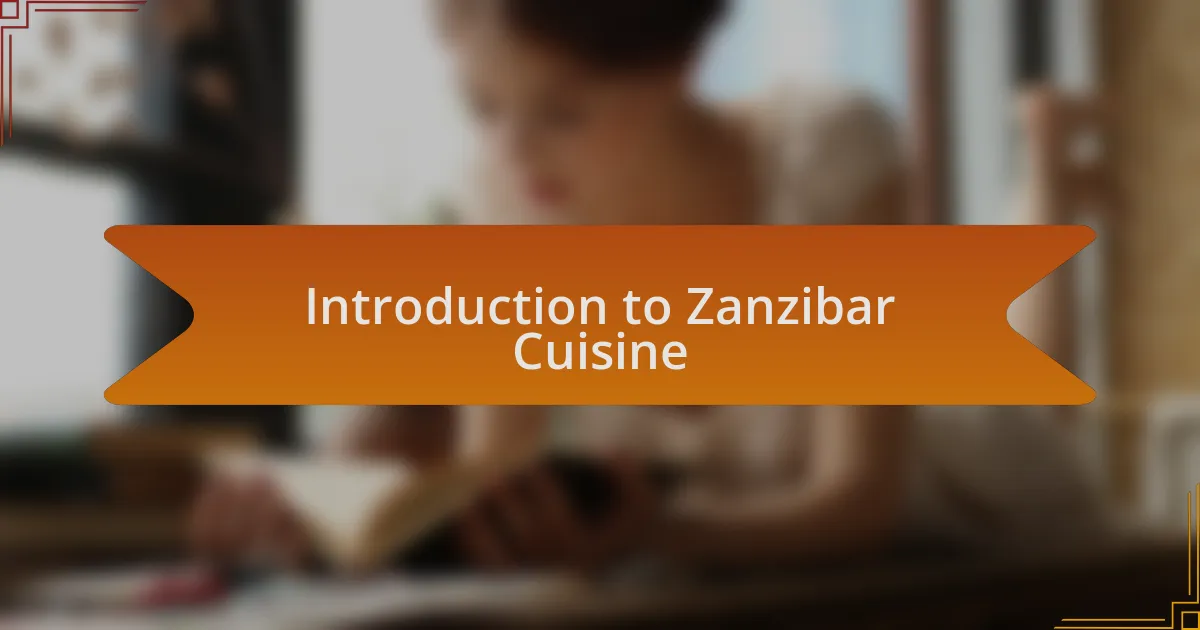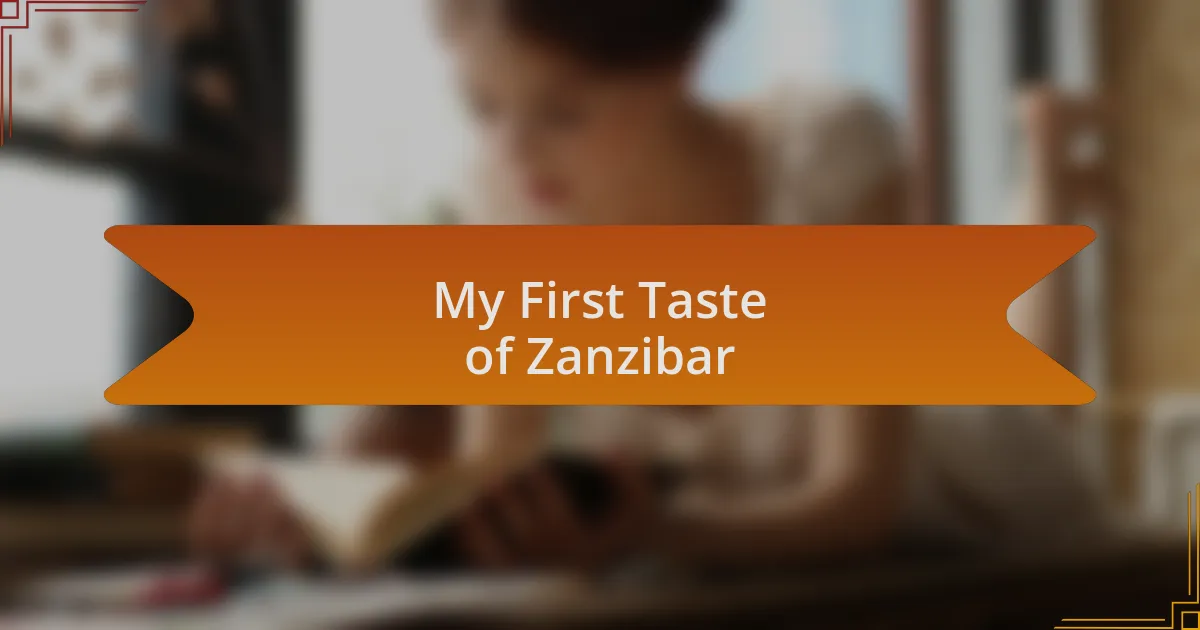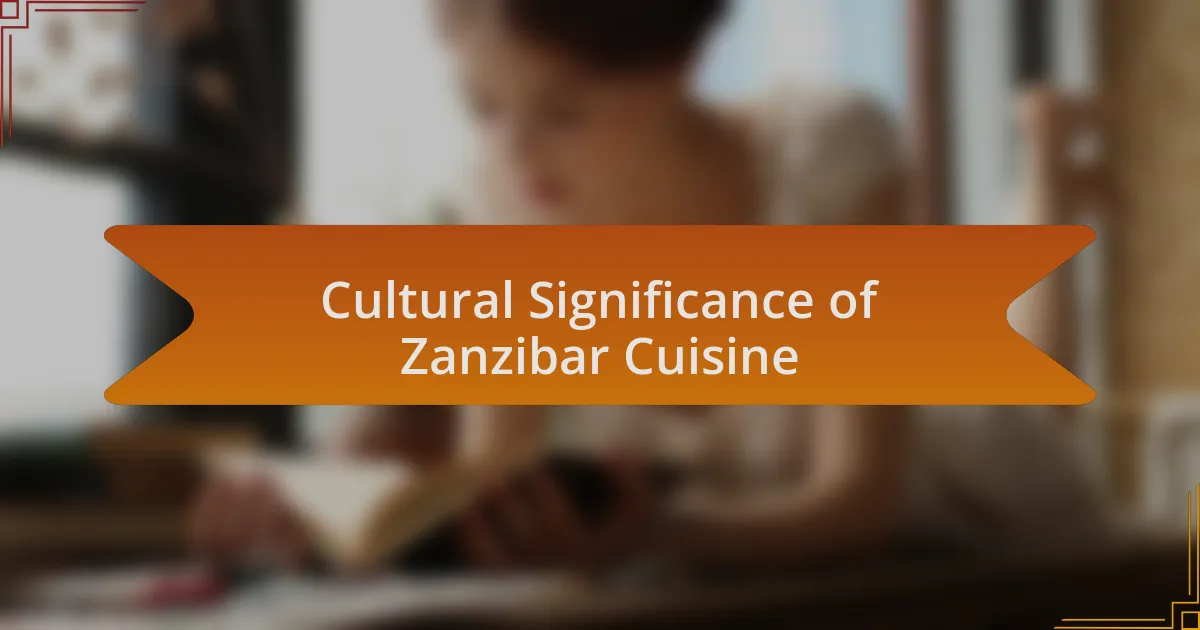Key takeaways:
- Zanzibar’s cuisine reflects a rich blend of African, Arab, Indian, and European influences, creating an adventurous dining experience.
- Local ingredients, especially fresh seafood and aromatic spices, are central to the vibrant flavors of Zanzibari dishes.
- Cultural significance is emphasized through communal meals and celebrations, showcasing how food acts as a bridge between generations and backgrounds.
- Cooking methods like using clay pots and grilling over coconut husks highlight traditional techniques that enhance the culinary experience.

Introduction to Zanzibar Cuisine
Zanzibar’s cuisine is a vibrant tapestry woven from its rich history and diverse cultural influences. As I wandered through the bustling streets of Stone Town, the aroma of spices swirling in the air immediately captivated my senses. It made me wonder, how can one small island hold such a wealth of flavors?
The fusion of African, Arab, Indian, and European culinary traditions creates a unique dining experience that reflects Zanzibar’s storied past. I vividly recall savoring a plate of spicy biryani, each bite transporting me back to the bustling markets where the spices were freshly ground. It’s incredible how food can tell a story, isn’t it?
Eating in Zanzibar is not just about nourishment; it’s an adventure for the senses. I remember sitting at a charming local eatery, surrounded by the laughter of families and the sizzling sound of seafood grilling. Each dish served felt like a celebration of community and culture, and I couldn’t help but feel a deep emotional connection to the island’s culinary heritage.

Overview of Local Ingredients
Local ingredients play a pivotal role in shaping the vibrant flavors of Zanzibar’s cuisine. Fresh seafood, often caught that very day, forms the backbone of many dishes. I remember the first time I tried grilled octopus; it was tender, bursting with flavor, and served with a squeeze of zesty lime. How can something so simple be so profoundly delicious?
The spices of Zanzibar are truly a highlight, with cardamom, cinnamon, and cloves creating an aromatic symphony. Walking through the spice markets, I was enveloped by their warm fragrances. It’s fascinating to think that these spices have been traded for centuries, each one carrying its own story of the island’s rich heritage. Have you ever experienced something that changes your perspective on flavor?
Fruits and vegetables are equally important, with mangoes, coconuts, and cassava often taking center stage. I still recall a refreshing coconut salad I enjoyed on a sun-soaked afternoon. The crispness of the fresh vegetables combined with the creamy coconut made every bite a celebration of the island’s bountiful harvests. Isn’t it amazing how local produce can transport you to a place of peace and satisfaction?

Popular Dishes in Zanzibar
Zanzibar’s cuisine is truly a treasure trove of flavors, and one dish that stands out is the iconic Zanzibar Pizza. When I first encountered it in a bustling market, I was intrigued by how this local delicacy is a delightful fusion of influences. Imagine biting into a thin, crispy dough filled with spiced meat, veggies, and a drizzle of tangy sauce. It’s an experience that feels like a warm hug on a chilly day.
Then, there’s Urojo, often referred to as Zanzibar’s soup of the gods. My first taste was unforgettable—so fragrant and comforting! The blend of tangy, spicy flavors along with a mix of fried samosas and fresh toppings was a revelation. Have you ever had a dish that made you feel at home, even in a foreign land? That’s exactly how Urojo made me feel.
Lastly, you can’t visit Zanzibar without trying the grilled fish, a staple that reflects the island’s rich maritime tradition. I fondly remember enjoying a freshly grilled snapper while watching the sunset over the ocean. The smoky flavor, enhanced by a sprinkle of local spices, paired perfectly with a side of coconut rice. It makes you appreciate how simple ingredients can come together to create a moment of pure bliss. What’s your favorite way to celebrate a meal?

My First Taste of Zanzibar
When I think back to my first taste of Zanzibar, the memory of spices dancing on my palate immediately comes to mind. I vividly recall walking through the vibrant Stone Town streets, the air thick with the aroma of cloves and cinnamon, pulling me toward a lively food stall where the enticing sounds of sizzling pans filled the air. It felt as if I was stepping into a culinary world that was both foreign and familiar, igniting a sense of adventure within me.
One dish that stole my heart was the spicy seafood curry. As I took that first bite, the richness of coconut milk mingled with tender shrimp and local vegetables created a flavor explosion that was simply unforgettable. It swept me off my feet, and I found myself questioning how a combination of such humble ingredients could evoke such profound joy. Have you ever had a dish that makes you marvel at the magic of cooking? For me, this was that moment—a reminder of how food can transcend borders and tell a story.
Just as impactful was my encounter with street food vendors selling freshly made mandazi, a sweet, fried dough treat. I didn’t expect to fall in love so quickly, but biting into the warm, crispy outer shell was like unwrapping a gift. It was a perfect companion to my morning coffee, and I often found myself returning to that stall, savoring the fleeting bliss of those golden bites. I still smile when I think of how something so simple could bring such playfulness to my mornings in Zanzibar. Have you found a dish that lingers in your memory?

Cooking Methods Used in Zanzibar
When it comes to cooking methods in Zanzibar, one of the most notable techniques I’ve encountered is the use of traditional clay pots, or “hararis.” I remember watching a local chef prepare a fragrant biryani, layering marinated meat and rice in one of these pots over an open fire. The way the earthy aroma seeped from the pot was entrancing—each layer blending together harmoniously, showcasing the importance of patience in Zanzibari cooking.
Another captivating method is grilling over coconut husks, which imparts a unique smoky flavor to the food. I’ll never forget the vibrant night market, where vendors grilled fresh fish skewers right before my eyes. The crackling sound and intoxicating scent made my mouth water; it felt like a communal experience, watching neighbors gather and share stories over delicious food. Have you ever smelled something so good that it pulled you in without a second thought?
Steaming is also prominent in Zanzibar’s culinary landscape. I experienced this firsthand when being invited to a local family’s home for a meal. They served “ugali,” a stiff porridge made from cornmeal, which had been steamed to perfection. The texture was just right, and I remember feeling a sense of warmth and satisfaction as everyone shared the dish—no utensils needed, just hands and laughter. It was a reminder of how food not only nourishes but also brings people together. Engaging in that moment truly felt like I had a seat at their table, sharing not just a meal, but a rich part of their culture.

Cultural Significance of Zanzibar Cuisine
The cultural significance of Zanzibar cuisine is deeply rooted in its history as a melting pot of diverse influences. During my visits to the spice markets, I was struck by how the vibrant colors and fragrances of the spices told a story of trade and cultural exchange. Can you imagine how these spices traveled across oceans, shaping the very essence of Zanzibari dishes? Every pinch of cinnamon or cardamom whispers tales of the past, connecting the present with a rich cultural heritage.
Sharing meals is a vital aspect of Zanzibari life, creating bonds that go beyond food itself. I recall sitting with a local family, where the joy was palpable as we passed around “samosas” and “zanzibar pizza.” The laughter shared over bites of crispy pastry felt sacred, almost as if we were weaving our own stories into the tapestry of tradition. Have you ever felt so connected to people through a meal that it transcended language? In those moments, I truly understood how food in Zanzibar acts as a bridge, uniting different generations and backgrounds.
Zanzibar cuisine also plays a crucial role in celebrations and communal gatherings. I’ll never forget participating in a wedding feast, where dishes like “pilau” and seafood delicacies took center stage. The air was thick with excitement, and I could feel the sense of pride as families presented their culinary creations. This intricate dance of flavors was more than just nourishment; it was a celebration of identity, resilience, and community spirit. Isn’t it fascinating how food can encapsulate the essence of a culture?

Reflection on My Culinary Journey
Every encounter I had with local cuisine in Zanzibar felt like an exploration of my own palate. I remember the first time I tasted “ugali,” a staple maize dish often served with a variety of sides. The simplicity of it amazed me, yet its ability to enhance the rich flavors of fish and vegetables was profound. Have you ever tasted something so humble, yet found it deeply satisfying? For me, it was like a culinary awakening, where the essence of Zanzibari culture unfolded with each bite.
One evening, as the sun dipped below the horizon, I found myself at a local restaurant, captivated by the aromas wafting from the kitchen. When “masala fish” was placed in front of me, I marveled at how the spices danced together in harmony. The experience was not just about eating; it became a moment of reflection. What stories could this fish tell? Each flavor seemed to carry echoes of the sea, the markets, and the people who meticulously prepared the meal. It was a reminder that every dish is a vessel of history and personal connection.
Looking back on my culinary journey, I realize it was more than just a series of meals; it was a series of relationships formed through taste. I recall sharing “biryani” with fellow travelers, our plates piled high with fragrant rice and tender meats, sparking conversations that bridged cultures. In those shared experiences, I felt a sense of belonging, as if we were part of something larger. Isn’t it incredible how food can not only nourish us but also create lasting memories?